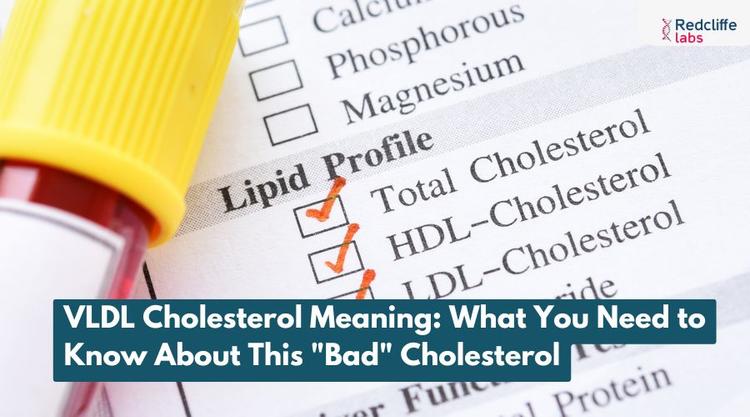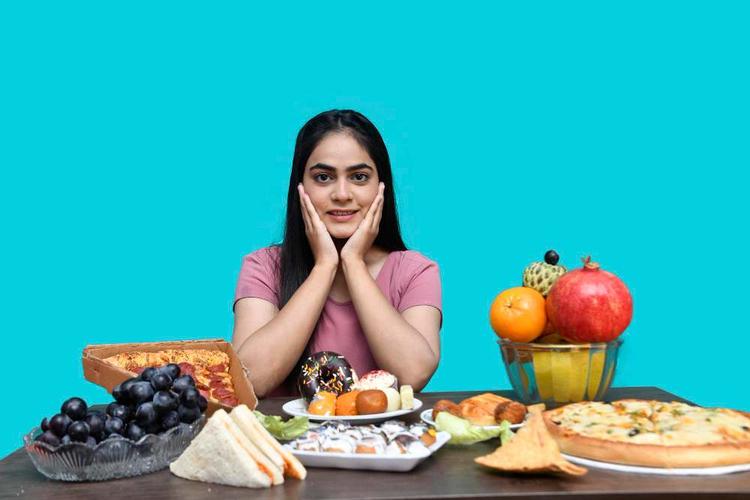How to Reduce Cholesterol During the Navratri Fast?

Medically Reviewed By
Dr. Geetanjali Gupta
Written By Sheena Mehta
on Oct 9, 2024
Last Edit Made By Sheena Mehta
on Jul 19, 2025

These nine days of Shardiya Navratri are auspicious and especially relevant as nine forms of the goddess Durga are worshiped.
Maa Durga devotees observe a fast and eat only vegetarian-friendly meals as part of the ritual. They also chant religious hymns of faith, seeking the goddess's immense love and protection.
Navratri can be a refreshing experience, but fasting during these nine days may pose health challenges for managing cholesterol levels.
Balancing the fasting requirements with the need to maintain cholesterol can be demanding. This blog highlights seven cholesterol-friendly snacks that will keep your cholesterol levels under check while giving you festive vibes.
What is cholesterol, and its impact?
Cholesterol is a fatty substance present in the blood. It is crucial for various bodily functions, including hormone production. There are two types of cholesterol: LDL (low-density lipoprotein) and HDL (high-density lipoprotein).
While HDL is a good cholesterol that promotes heart health, LDL is a bad cholesterol that can cause heart disease and stroke. When LDL is excessive and reaches harmful levels, it can lodge inside artery walls, narrowing them and finally blocking them.
The leading cause of LDL, or bad cholesterol, is a bad lifestyle and an excessive intake of unhealthy fatty foods.
Also read: https://redcliffelabs.com/myhealth/heart/is-cardiac-arrest-different-from-heart-attack/
Main Symptoms of Cholesterol
Regretfully, high cholesterol doesn’t have any signs. However, only a healthcare professional can help determine if you have high cholesterol. If the problem is not treated on time, it may increase the risk. Symptoms of high cholesterol are chest pain, stroke, or heart attack.
Note: A healthy diet and dietary changes can help prevent harmful cholesterol levels.
8 Cholesterol-Friendly Ideas to Stay Healthy During Navratri
The cholesterol-friendly ideas to stay healthy during Navratri include:
1. Eat heart-healthy fasting foods
Eating heart-healthy fasting foods is essential. Fiber is vital for reducing cholesterol. Opting for whole grains instead of heavily processed items helps control cholesterol. Roti prepared with kuttu (buckwheat), rajgira (amaranth), and singhara (water chestnut) are naturally gluten-free and contain high fiber content.
Furthermore, fruits such as apples, pears, and citrus contain soluble fiber, which aids in reducing LDL cholesterol. Incorporating them into your fasting plate can promote heart health.
Vegetables such as pumpkin, sweet potato, and spinach are also rich in fiber and antioxidants, which can help lower cholesterol.
Health Tips: Do not use ghee or butter in large amounts as they contain unhealthy fats. Olive oil is rich in monounsaturated fats, which help increase HDL and lower LDL.
2. Avoid fried foods.
Deep-fried foods such as fried pakora, aloo, and sabudana vada are common during Navratri fasting. They can be saturated with trans fats, which contribute to bad cholesterol. Besides, fried foods are high in calories and contain unfavorable compounds, which can lower your energy levels during fasting.
Instead of frying, you can bake or air-dry these items to reap the benefits. Baked sabudana vadas are good for your heart. Similarly, grilled paneer tikka can be relished as a protein-rich meal that is also low in unhealthy fats.
3. Avoid sweets made with sugar.
Traditional Navratri sweets such as Makhana kheer, Malpua, Lauki Halwa, etc., are sugar-laden sweets that can increase cholesterol levels. Excessive sugar consumption is not good for health, as it is linked with higher triglyceride levels and reduced HDL or good cholesterol.
Make healthy desserts such as amaranth pudding, rajgira ladoo, or sabudana kheer using natural sweeteners such as jaggery or honey, and limit the portion sizes of your sweet treats.
Besides, a simple fruit salad with pomegranate, apples, and berries is a great choice to satisfy your sweet tooth without raising cholesterol levels.
4. Add nuts and seeds for Omega-3s.
Nuts such as almonds, walnuts, flaxseeds, and chia seeds are excellent sources of omega-3 fatty acids, which makes them a wonderful addition to heart health. Foods rich in Omega-3s help reduce triglycerides, raise HDL (good cholesterol), and lower LDL (bad cholesterol).
Nuts are seeds and are ideal snacks during fasting that promote heart health. However, control the portions, as they are calorie-dense.
5. Stay Hydrated
Staying hydrated is essential during the fast. It also supports digestion. In addition to water, you can drink coconut water for electrolyte balance, which can also be refreshing.
Herbal teas such as green tea or tulsi tea are rich in antioxidants, contributing to improving cholesterol levels.
Avoid sugar-laden beverages like packaged fruit juices, sodas, or sweetened powdered drinks. Their intake can spike triglyceride levels, which is not good for your heart health.
6. Regular Exercise
Exercise is a good way to lower LDL levels and increase HDL levels, improving overall heart health. Staying physically active during Navratri is essential. During Garba nights, engage in moderate physical exercises such as walking, yoga, or even dancing to remain charged.
Heavy workouts are strictly not recommended. Aim for light physical activity for at least half an hour. You can also reduce or increase time if needed.
7. Avoid high-sodium foods
Excessive salt intake can raise blood pressure, which you don’t want during fasting or otherwise. Salted nuts, processed fasting snacks, and ready-made packaged foods contain high sodium content and thus indirectly affect your health.
Even sendha namak (rock salt) should be consumed in moderation. Making vrat-friendly or fasting meals at home helps control the sodium content.
8. Eating in moderation
Once you are done fasting, you tend to eat more. This can put pressure on our digestive systems and lead to weight gain. Hence, eating vrat ka khana (a fasting meal) in a limited portion becomes even more important to prevent overheating and maintain healthy cholesterol levels.
Sticking to small, frequent meals instead of one large meal is better to keep it light.
6 Cholesterol-friendly snacks: You may like to know
Navratri 2024 is here! Fill your kitchen with these seven cholesterol-friendly snacks, a healthy way to enjoy fasting:
- Roasted Makhana: This is an excellent vrat snack. It is low in calories and loaded with essential nutrients. Season it with rock salt for flavor.
- Sabudana Khichdi: Prepare sabudana khichdi with minimal oil and roasted peanuts. It is a wonderful cholesterol-friendly snack.
- Samak Rice: During fasting, you can eat upma prepared with samak rice. To enhance the flavor, add green chilis, peanuts, and sendha namak (rock salt).
- Baked sweet potatoes: Sweet potatoes contain fiber and are low in cholesterol. Slice sweet potatoes, season them with spices, and bake until crispy.
- Cucumber and yogurt dip: You can also choose to dice cucumber and mix it with yogurt dip and mint leaves. This is a great low-cholesterol option.
- Fruit Chaat: Make a fruit chaat with fruits like apples, bananas, and pomegranate seeds. Sprinkle rock salt and a dash of lemon on the sliced fruits. Your healthy vrat snack is ready.
Why Get Tested for Cholesterol before Navratri 2024?
It is crucial to get tested for cholesterol before Navratri 2024. This is a proactive approach to managing your health.
4 Key Reasons Include:
Getting tested before Navratri can help you fast in a way that aligns with your health needs while still maintaining the festive spirit. Some of its reasons include
- Cholesterol is a baseline health check that helps you make informed choices about your diet.
- Knowing your cholesterol levels can help you include only fast-friendly foods.
- You should get tested before 1-2 weeks of Diwali to make dietary changes. Don’t forget to discuss your health report with your doctor.
- The lipid profile test is the cholesterol test, which typically includes:
- Total cholesterol measures the amount of cholesterol and certain fats in your blood.
- Low-density lipoprotein (LDL): The LDL test measures the amount of cholesterol found inside LDL in a blood sample.
- High-density lipoprotein (HDL): The HDL test measures the amount of good cholesterol in your blood.
- Triglycerides is a blood test that checks for fat in your blood.
Getting Interested? Book a Cholesterol Test with Redcliffe Labs!
Book your cholesterol lipid profile test online with Redcliffe Labs for INR 399 only. It is a reputed lab that offers many tests with home collection services. Get the most accurate test reports within a given time. This is to make it convenient for you to get tested without stepping out from home. So, why wait? Get yourself tested with Healthy India ki Trusted Lab, Redcliffe Labs, and rest assured.
Frequently Asked Questions
1. Is eating dairy products during Navratri fasting okay if I have high cholesterol?
Yes. You should choose low-fat or fat-free dairy products such as yogurt or skimmed milk. Besides, consume paneer in moderation, but don’t fry it.
2. Can I eat potatoes for cholesterol control?
Yes, but do not fry potatoes; eat them in moderation. Boiled or baked potatoes seasoned with rock salt and herbs can be more beneficial.
3. Is it okay to drink coconut water for cholesterol?
Yes. It will be great as it is low in calories, cholesterol-free, and full of nutrients. Coconut water is a great hydrating drink during Navratri.
4. Can I eat nuts daily during fasting?
Yes. During fasting, you can eat a handful of nuts daily, such as almonds, raisins, cashew nuts, and walnuts. This means you are feeding your body with goodness.
5. Can I eat jaggery during Navratri?
Jaggery is a healthier substitute for refined sugar. However, moderation is key. It contains calories, and overconsumption can lead to weight gain.


